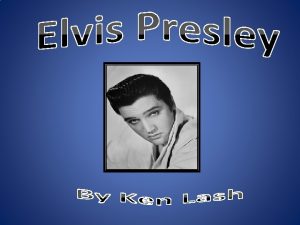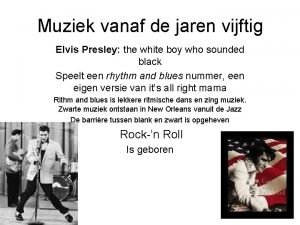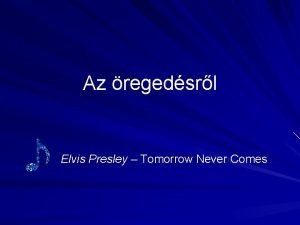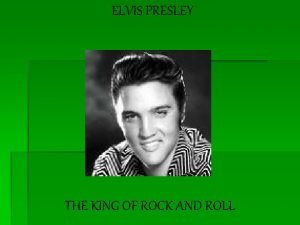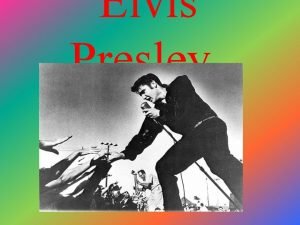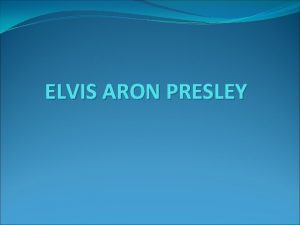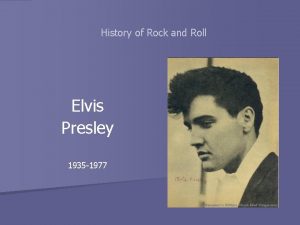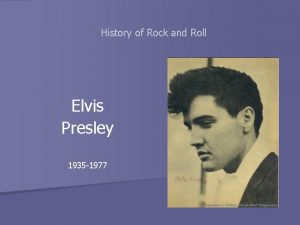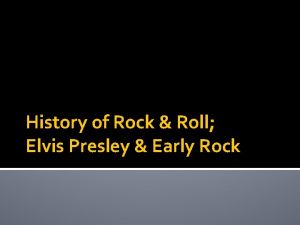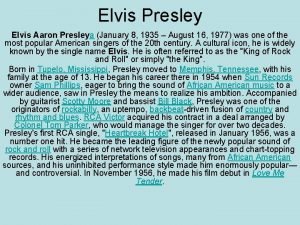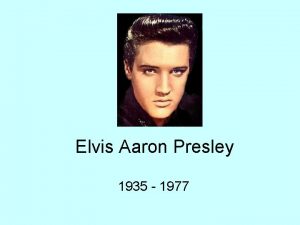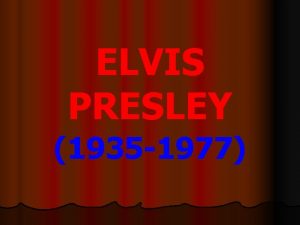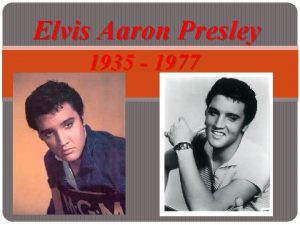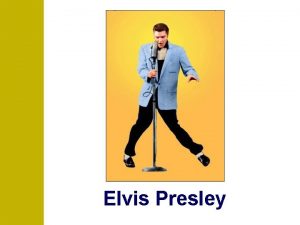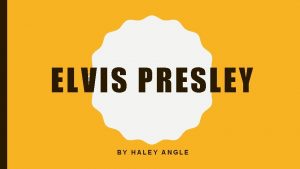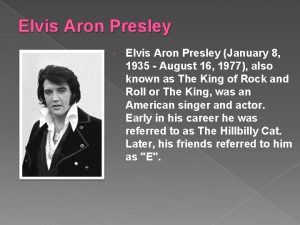History of Rock and Roll Elvis Presley 1935

















- Slides: 17

History of Rock and Roll Elvis Presley 1935 -1977

ELVIS 2 Sam Phillips (1923 -2003) n Elvis was “discovered” by independent music producer Sam Phillips n Phillips had worked as a disc jockey at WREC in Memphis late 40's n Phillips was interested in rootsbased, blues and R&B, African. American music genres n In 1952, Phillips founded his own label, Sun Records, in Memphis. Phillips is identified with the following quote: “If only I could find a white man who had the Negro sound and the Negro feel, I could make a billion dollars.

ELVIS 3 - Sun Records In addition to his blues recordings, Sam Phillips and Sun Records pioneered the “Rockabilly” style. n Phillips was the first to record Elvis, Jerry Lee Lewis, Johnny Cash, Carl Perkins, Roy Orbison, and others n Phillips’ rockabilly sound was characterized by: n n n The use of “slapping bass” for rhythm The use of “slap-back echo” Emphasis on guitar “solos” …more on all this during the “Rockabilly” lecture ! !

ELVIS 4 – First big hit, “That’s All Right Mama” n Recorded at Sun, July 1954 n Cover of an original R&B tune by Arthur “Big Boy” Crudup n Elvis, Scotty Moore (guitar), Bill Black (bass) n Intending to record “Blue Moon of Kentucky” n Phillips heard them playing “That’s All Right” during a break, and made that the “A” side of the single instead

ELVIS 5 – early bio n n n n Born 1935, Tupelo, MS Twin brother died at birth Family poor; various troubles Mom bought him a guitar when he was around 10 or 11 Moved to Memphis age 13 Musical influences: country, Memphis blues & jazz musicians, church music he heard as a child (Ao. G and Baptist) Begins recording career in 1956, age 21 Gladys, Elvis and Vernon Presley

ELVIS 6 Colonel Tom Parker and RCA Parker made changes right away: n n Near the end of 1955, Elvis got a manager: Colonel Tom Parker’s control of Elvis career lasted right up until Elvis’ death in 1977. His “split” of the profits eventually reached 50 per cent. n He sold Presley's record contract to RCA for 35, 000 dollars n He got Elvis a number of TV appearances n He got Elvis a movie contract with MGM

ELVIS 7 – 58 weeks at #1 n Elvis’ RCA style: more drums, harder “rock and roll” sound (as opposed to Sun “rockabilly” style) n Elvis’ first single for RCA was “Heartbreak Hotel” – 1956 n In 1956 and 1957, Elvis held the #1 position on the pop music charts for 58 weeks.

ELVIS 8 – First TV appearances FIRST TV APPEARANCE: Dorsey Brothers Stage Show 1956 (with Scotty Moore and Bill Black) One month later: Milton Berle Show (with Scotty Moore, Bill Black, and drummer DJ Fontana)

ELVIS 9 – Ed Sullivan n Sullivan had refused to have Elvis on his show – “too controversial” – why ? ? n Impressed by the ratings of the other shows, he relented n Sullivan ordered his camera crew to film Elvis only “from the waist up. ” Elvis’ first Sullivan appearance was almost exactly 50 years ago: 9/9/56

ELVIS 10 – Elvis the Movie Star With Elvis’ movie contract with MGM, the King of Rock and Roll also became a movie star. He made four movies in the 1950 s: n n Love Me Tender Jailhouse Rock Loving You King Creole

ELVIS 11 – The Army n 1958: Elvis was drafted n On Parker’s advice, he did not enter Special Services n Though Elvis worried about his career, his army stint changed his public image from “bad boy” to upstanding citizen n His mother passed away while he was in the Army n He also met his future wife Priscilla at this time, but she was only 14

ELVIS 12– early 60 s Elvis got out of the army in 1960 n Made more movies n Style leaned more toward ballads, pop songs n Not as many hits -- early 60 s charts dominated by British Invasion, folk-rock n Has a Hit in 1965 with “Crying in the Chapel” n May 1967: Elvis marries Priscilla Beaulieu

ELVIS 13 – 1968 “Comeback” Special n 1968: Elvis makes a TV show for NBC, billed as his “Comeback Special” n Music was much more like his early material n Often regarded as one of his best performances

ELVIS 14 – late 60 s early 70 s: Las Vegas Elvis n Elvis still world-famous, despite a decline in actual Top 40 hits n Starts performing live again, especially in Las Vegas n Personal problems: prescription drug abuse, etc n 1969 -70: finally another big hit with “Suspicious Minds” Pictured: Elvis meets Nixon, 1970. Elvis asks Nixon if he can have an FBI badge for his badge collection. He gets the badge and a tour of FBI headquarters.

ELVIS 15 – 70’s 1970 s: n Elvis still touring, despite various health and drug problems n Still a popular Las Vegas act as well n Several country and gospel recordings n Became somewhat reclusive after his divorce in 1973

ELVIS 16 – August 16, 1977 Elvis’ funeral Elvis is found dead at his home, Graceland. His death is ruled a heart attack. Literally hundreds of thousands of people attend his funeral. He is buried next to his mother (both graves are now at Graceland. )

Elvis 17 - Legacy n Elvis became a rock and roll “Icon” (What is an icon? ) n Elvis was the first rock and roll musician to reach such an extreme degree of world-wide fame and commercial success n Elvis’ musical influences reflected the wide diversity of American popular music n This diversity contributed to an expanded notion of what constitutes “rock and roll” music
 Elvis presley prezentace
Elvis presley prezentace Los ojos de la española elvis
Los ojos de la española elvis Elvis presley tombstone misspelled
Elvis presley tombstone misspelled The incredible elvis presley life story began when
The incredible elvis presley life story began when Jazz oervorm van de jamaicaanse reggae
Jazz oervorm van de jamaicaanse reggae Elvis presley ponte sobre águas turbulentas
Elvis presley ponte sobre águas turbulentas Elvis presley ponte sobre águas turbulentas
Elvis presley ponte sobre águas turbulentas If tomorrow never comes elvis presley
If tomorrow never comes elvis presley Romy schneider elvis presley
Romy schneider elvis presley Sublime gracia autor
Sublime gracia autor Elvis presley silent night
Elvis presley silent night Elvis presley podpis
Elvis presley podpis For his eleventh birthday elvis presley
For his eleventh birthday elvis presley Presley strutts
Presley strutts Types of igneous sedimentary and metamorphic rocks
Types of igneous sedimentary and metamorphic rocks Roll roll seminole wind
Roll roll seminole wind Have you heard about the rock and roll snowman
Have you heard about the rock and roll snowman Rock and roll prezentacja
Rock and roll prezentacja



